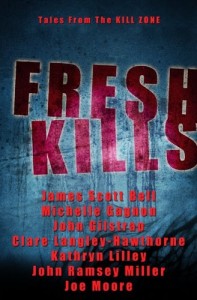
Monthly Archives: February 2010
Short Stories Matter
As you know, we’ve been celebrating the release of Fresh Kills here on TKZ. It’s been a pleasure working with my blogmates, pros all, to bring you these new stories, at an attractive price. Look for Fresh Kills at amazon, scribd or smashwords.
My contribution to the anthology is “Laughing Matters,” a title that has more than one meaning, as you’ll find out. And that’s sort of what the best short stories do; they work on at least a couple of levels.
Certainly, the literary short story is like that. In college I got to take a writing workshop with Raymond Carver, and that’s what his stories are famous for. They have something going on up top, on the surface, but when you finish you realize there’s a rich layer underneath that you’ve missed (and I have to confess, I usually did, and would have to re-read each one a couple of times).
In the suspense or mystery category, you need to deliver a story that has a surprise in it somewhere, to keep the reader guessing. Jeffery Deaver has written two volumes of such tales in his Twisted series, and even challenges the reader to try to outguess him. It’s cool when it works, but it’s hard to do. Which is why this kind of story is every bit as challenging as the literary sort.
The germ of “Laughing Matters” came one day when I was thinking about all the standup comics in LA who never make it. I must have just seen some clip of a comedian doing post-Seinfeld observational humor (one of thousands) and just thought, this is dull. This is derivative. This guy’s not going to go very far.
Which reminded me of a time when I was living and acting in New York, and went to a comedy club for “open mike.” There were some funny guys, and then there was this one kid who was obviously onstage for the first time. The sort whose grandmother must have told him, “Sonny, you are so funny! You should go tell your jokes on television!”
Anyway, the kid comes out, he’s nervous, and tells a joke. It fell to the ground with a thud that echoed through the club. He got rattled. And you know what happens when you get rattled in front of the 11 p.m. crowd in New York City on open mike night? It was brutal. The kid made it through maybe two more jokes, neither of which worked, and then froze. As the crowd piled on with jeers and snorts, he stood there, choking the mike stand, unable to move or speak.
The emcee, noting what was going on, jumped in from the wings with his big smile, clapping his hands, shouting “Let’s hear it for _____ !” and then took the guy’s arm and guided him off the stage.
There must have been public hangings easier to watch.
So all of that came to me as I wrote the opening lines:
He died.
Pete Harvey, “The Harv” as he billed himself, just flat out died in front of the 11 p.m. crowd at the Comedy Zone.
Then I have Pete sitting at the bar afterward, drowning his sorrows, when a most interesting gent sits down next to him. And the story came to me in a flash, twists and all. This is, I’d wager, how the best short stories usually appear. But then you write, re-write and polish, and hopefully come up with something that works.
I’ve reclaimed my love of the short story, and have decided to keep writing them. Maybe I’ll put out my own collection sometime. It’s nice to have a market for stories again. Because short stories matter, it seems to me. A good story can deliver a hugely satisfying reading experience in small span of time.
FWIW, here are some of my favorite short stories, based on the wallop I felt at the end:
“Hills Like White Elephants,” Ernest Hemingway
“Soldier’s Home,” Ernest Hemingway
“The Daring Young Man on the Flying Trapeze,” William Saroyan
“A Word to Scoffers,” William Saroyan
“A Perfect Day for Bananafish,” J.D. Salinger
“The End of the Tiger,” John D. MacDonald
“Chapter and Verse,” Jeffery Deaver
Tomorrow, we return you to your regularly scheduled blog. It’s been a pleasure to offer you our wares in Fresh Kills. Thanks for taking us for a spin.
FAMILY AGAIN, A Short Story Story
When we came up with the idea of producing an e-book of our short stories, I was horrified. A SHORT STORY? Like Gilstrap, I wrote short stories when I was in high school. I lived in the Mississippi Delta, a story rich environment if there ever was one. I don’t remember but a couple of them. I wrote one called “Baby’s Chair,” which was about an ancient black woman, called Baby, was living in a cypress shack on a cotton plantation. I knew a lot of Cotton Plantation families, and spent time on several so I wrote about an elderly woman who, having long passed her usefulness to the place, and being almost totally blind, spent her days rocking on the porch when the weather was warm. She’d spent her life in the service of several generations of the owners, but now she was totally dependent on the largess of the young owner, whom she had basically raised, and he loved her like family and made sure she had food and shelter. He was all that stood between her and the street.
This youngest of the owning family was running the place and he’d married a coldly calculating-spoiled bitch. The ancient woman had only had one major possession, an old Stickley Brothers rocking chair the plantation owner’s great grandmother had given the now old woman’s mother because it didn’t fit in her refurbished home. The old woman’s mother had rocked this old women in it when she was a baby, and Baby had rocked her own children and grandies in the chair, as well as the owners’ children. There was a cigarette burn in the arm where her father had died and his cigarette had caused the blemish. In fact the chair was filled with memories of her hard life.
The bitch came by with a casserole and it was fast obvious that she coveted the chair because it did fit in with her new den remodel, and it was valuable and she was greedy and coveting what she didn’t have kept her heart pumping motor oil. Sticky sweet, she flatters the old woman, eventually offering a new recliner for the old rickety chair. Baby manages to cleverly deflect the woman’s entreaties, and leaves the woman frustrated and angry. The new owner comes by later (prodded by his wife) and makes the entreaty that his wife wants the chair and he’ll pay her more than it’s worth. He even tells Baby that the chair is valuable to him because it means so much to her, which is true. He obviously loves the old woman, and is embarrassed because his wife is pressuring him to get the chair back. Baby tells him he can have the chair soon because she will have no more use for it, being on the edge of “Going To Glory” as she was. That afternoon as Baby sits in the chair with her memories, she can suddenly see everything, and to her amazement Baby looks at her hands and they are the hands she had when she was very young. Looking up, she sees a horse drawn wagon pull up in front of the porch. Her father is driving the wagon and invites her to accompany him home. Happy, she steps into the wagon and goes off toward Heaven.
Later the young owner returns and finds Baby dead in the chair. He cries. When the ambulance picks up baby, the bitch puts her chair into the back of her husband’s truck.
Weeks later the bitch is entertaining her friends in her new den with pecky cypress walls she’d had taken from Baby’s demolished home, and telling them how this valuable antique has been in her husband’s family for generations and she lies about the history of the valuable chair. When she is alone after the party she sits in the chair and finds she can’t get out of it. In the space of a few minutes, her eyes dim as cataracts bloom in them, and her hands become wrinkled and covered in liver spots.
I wrote dozens upon dozens of mostly forgettable stories––Southern Gothic themes all––and they entertained my family and were good exercise. One was about an old man in a collapsing (but once grand) mansion, who put the stringer of fish he caught in a dresser drawer. They were all hand-written on onion- skin paper and were all lost decades ago. I didn’t care that they were lost so they wouldn’t embarrass me later.
When we Kill Zone authors to write the seven short stories for FRESH KILLS I played with a few ideas. What I came up with was extrapolating on the what would happen if our civilization collapsed and our children and grandchildren were left to for themselves in a world that placed no value on them. I imagined my grandson at ten or eleven wandering in the woods and coming upon a couple, a pair of survivalists, who’d managed to survive in a home built into a hillside and impenetrable to assault. They take the child in, warm him and feed him and things take a deadly turn. I called the piece, FAMILY AGAIN, and hope it is as entertaining to readers as it was for me to write.
I think we all think about what would happen to our loved ones if we were not there to nurture them, and their welfare was left to the kindness of strangers. How would they figure out ways to survive without anything more than the tools we have given them? This is one scenario of how things might turn out, and of course there’s a twist at the end.
The Before That Led to “In the After”
by John Gilstrap
http://www.johngilstrap.com/
When I was a kid—actually all the way through high school—I churned out short stories by the dozens, sometimes on command to meet the requirements of English class, but mostly because I loved writing. For me, a short story assignment was as close to a guaranteed A as one could reasonably hope for. I read voraciously in those years, and thanks in large measure to The Twilight Zone, Night Gallery and their ilk, I grew up steeped in short-form fiction.
I used to read Writers Market in the 1970s and mentally catalog all of the outlets for my stories, preparing myself for the day when I felt that my writing would evolve past high-school good and become professional-writer good. If I recall properly, Playboy was paying $1500 for short stories back then. Who knew that Playboy even had words? All of the big-format magazines carried short stories, too. I was in training to leave my mark on the world.
Unfortunately, when I got to college, my story production sagged precipitously, thanks to my libido and my love of a good party. My attentions were wildly diffused in directions that had nothing to do with academics, and when my grades started to nose dive, something had to go. After careful deliberation, I decided to stay with the dating and the academics and the booze (not necessarily in that order), and stopped my recreational writing.
Meanwhile, the market for short stories evaporated. That was just as well, because by the time I started writing again, my interests had shifted exclusively to long-form fiction. I never looked back—not until my editor at Kensington suggested that I write a short story for my website that would help promote my book, No Mercy, and its main character, Jonathan Grave. That story became “Discipline” and it introduces readers to Jonathan’s bizarre childhood. That was the first short story I’d written in something like thirty years, and I loved the experience.
Just a couple of months after I posted that story to my website, my blog mates came up with the idea of the anthology that became Fresh Kills: Tales from the Killzone (actually, I think it was James Scott Bell’s suggestion, but I can’t swear to it). My initial reaction was twofold: On one hand, I thought it was a great idea, but on the other, I confess that I bristled at the notion of joining the world of “self-published” authors. I worried that it would be read by some as a form of desperation. Let’s face it: self-publishing is not exactly held in the highest regard among my fellow authors, and the last thing I needed was for a good idea to inadvertently harm my career. Call me shallow, but the publishing business is scary these days.
I consulted with both my agent and my editor, and, to my relief, they were both very supportive of the idea. I think it was the uniqueness of the concept as much as anything else. I’m not aware of a similar project out there that combines the talents of established authors in a self-published book, and I think I can speak for the other Killzoners that we won’t complain if we get some positive buzz about this. So, with their approval in my pocket, I signed on.
And what a hoot it turned out to be! Initially, I thought I would do another story of Jonathan Grave in his youth, but that struck me as a conflict of interest—especially since “Discipline” is offered on my website free of charge–a pattern I want to continue. I went mining for ideas, tried a couple of them out, but remained largely uninspired. With our deadline approaching, I found myself with bupkis.
Finally, the muse found me where she often does: in the shower, when my mind was in neutral. I thought it would be really cool to do a story of delayed revenge, a high-tension thriller presented on a tiny canvas. The “feel” of the story hit me before the plot points did. I wanted the reader to feel frightened, and claustrophobic as the victim learns his fate. I wanted the victim in this case to be the protagonist, and I wanted his sense of loss to be enormous.
And because it’s a short story, I wanted it to have a huge twist in the end.
I was on travel on the occasion of this particular inspiration, and because I didn’t know exactly where I wanted it to go, I resorted to pen and paper—ever the best way for me to work through plot points. Twenty-odd handwritten pages later, the story was done. I call it “In The After” because, well . . . Actually, I can’t tell you without giving too much away.
I can tell you this, though: I’m already looking forward to Volume Two.
The Chicken Guy
Excerpt from THE TUNNELS:
“So what do you think?”
Kelly looked up from her notes to find Morrow watching her, rocking back and forth on his heels with a half-smile.
“Not our guy.” She rubbed her eyes with a thumb and forefinger and suppressed a yawn.
“Told you. Long day, huh? Where’d they pull you in from?”
“Jersey.”
“Oh, right, the chicken guy. Nice work on that one.”
“Thanks…”
In my debut thriller THE TUNNELS, I made this oblique reference to FBI Special Agent Kelly Jones’s previous case. Over the years I’ve received several emails from readers curious to hear more about “The Chicken Guy” (although as we here at The Kill Zone know, by all rights that title belongs to Mr. John Ramsey Miller, who is currently breeding a chicken army for world conquest).
So when it came time to submit a story for our anthology, I thought this would be great material to mine.
I’ve probably only composed a few dozen short stories total over the course of my writing career. With this one, I decided to focus on a single setting, the scene that would mark the climax if it were a full novel. I wanted to write something that was almost pure action, where you really got to see Kelly do what she does best.
I enjoyed exploring my heroine through a prequel. Part of the story laid the groundwork for crises she’d face down the line, tests of her moral code that over the course of my series have become increasingly challenge for her to pass. Hints of that popped up as I was writing The Chi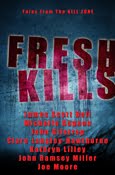 cken Guy. Knowing where she ends up made it much easier to figure out where she started.
cken Guy. Knowing where she ends up made it much easier to figure out where she started.
As I was editing, I caught myself wondering if I would have written the story the same way if I’d tackled it immediately before writing THE TUNNELS. And as I’m putting the finishing touches on my fourth novel featuring the same characters, I was struck by how much Kelly in particular had been forced to change. What I love about writing a series (and about watching a well-made TV series, as opposed to a film) is that it enables a much greater story arc. A character grapples with different challenges in each book, challenges that shape how they’ll act when faced with new situations down the line. I’ve put Kelly through the wringer over the course of these four books. She’s emerged far more damaged than when she started, but in a way stronger than she was at the outset. It was interesting for me to look back on her through this lens, to see how far she’s come in so many ways.
We’re discussing assembling another anthology later in the year. For that one, I’m toying with the idea of delving further into the life of a more minor character from the series, one I haven’t had the opportunity to really explore. What I’ve discovered through this process is that short stories can be a great tool for character development, a chance to see how a tangential story line can have an impact. As Joe said, this is a great format to do that kind of exploration.
The anthology is available on Amazon and at Smashwords for the bargain price of $2.99.
Final Flight: a one-way ticket
By Joe Moore
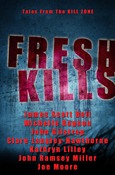 As you probably have guessed by now, this is promote FRESH KILLS week. Our newly minted collection of short stories is available online at Amazon, Scribd and Smashwords, and may soon be making its appearance in other online stores. So why did seven established authors decide to put together a short story anthology and publish it ourselves? Remember that some of us (me included) have never written a short story before. Also remember that pricing our little shindig for $2.99 and splitting the net proceeds 7 ways will not make us rich. (John “Colonel Sanders” Miller is still going to have to sell a lot of those free-range eggs) Here’s why I think we did it.
As you probably have guessed by now, this is promote FRESH KILLS week. Our newly minted collection of short stories is available online at Amazon, Scribd and Smashwords, and may soon be making its appearance in other online stores. So why did seven established authors decide to put together a short story anthology and publish it ourselves? Remember that some of us (me included) have never written a short story before. Also remember that pricing our little shindig for $2.99 and splitting the net proceeds 7 ways will not make us rich. (John “Colonel Sanders” Miller is still going to have to sell a lot of those free-range eggs) Here’s why I think we did it.
It wasn’t that many years ago that publishing our own book would have been quite different. We would have placed it in the hands of an agent (7 to choose from), had her pitch it to all our publishers (another 7 among us) and if needed, other houses, hoped for a bite and maybe a huge advance that, after the 7-way split, would at least buy each of us a Happy Meal. Finally, we would have waited the 10-12 months for the book to hit the shelves.
Today, things are changing. That’s not to say that doing it the traditional way would not have worked. But in 2010, there are alternative methods of getting published. The route we took is NOT for everyone. But it is a route that is AVAILABLE to everyone. In our case, we are 7 published authors who make money writing fiction. Many of us have been on national and international bestseller lists. You can go into a bookstore and buy our books. We knew from day one that the quality of the contributed short stories would be good because we are professionals at our craft. We also have the highest regard for each other. With all that in mind, I think the reason we did it was because we could.
If FRESH KILLS sells well, great. If it doesn’t, that’s OK, too. We have virtually nothing to lose and everything to gain with this project. The point is, we banded together and within about a month, we went from a raw idea to a book published and available for sale to the public. We wrote the stories, designed the cover, formatted the text, opened the accounts, wrote the promotional blurbs and press releases, scattered the marketing announcements across the Internet, and maintained TOTAL control over our product.
Guess what folks? The publishing world is changing. And I think the seven of us feel some satisfaction that we are adapting to those changes.
So to give Miller’s chickens a break, download a copy of FRESH KILLS, Tales from the Kill Zone to your Kindle or PC today.
Now on to my short story contribution called FINAL FLIGHT. About 15 years ago, I had an idea for a novel about a pilot who was ordered to fly a secret mission with a mysterious cargo through a terrible winter storm. The cargo was an experimental nuclear weapon. He crashed in the mountains and the weapon was not found until years later when a group of terrorists located the wreckage and salvaged the bomb. I only wrote the first chapter before filing it away and moving on.
Now jump forward to last December when the idea of a Kill Zone anthology emerged. The first thing I did was start rummaging through my files for a story idea. Out jumped that first chapter from years ago. (Advice: never throw anything away) Of course, telling the original story would have resulted in 110k words and about a year’s worth of writing. So I thought, what if the cargo wasn’t a WMD but something even more devastating to one person in particular: the pilot. I quickly reworked the chapter and changed the ending. Problem was, I only had about 2k words. We had all agreed a minimum of 4k per story. I had a big hole in the middle to fill.
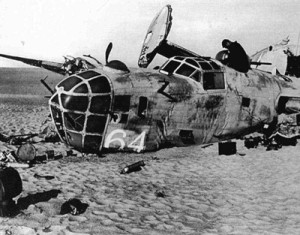 That’s when I remembered an article I’d read some time ago about the disappearance of the WWII B-24 Liberator called the Lady Be Good. Coming back from a bombing run to their base on the northern coast of Africa, the B-24 became lost, over-flew the base, and crashed in the desert. This was in 1943. It’s a BIG desert. The wreckage wasn’t found until 1959, and the plane was still in pretty good shape 16 years later. After reading the article again, I realized I had my middle.
That’s when I remembered an article I’d read some time ago about the disappearance of the WWII B-24 Liberator called the Lady Be Good. Coming back from a bombing run to their base on the northern coast of Africa, the B-24 became lost, over-flew the base, and crashed in the desert. This was in 1943. It’s a BIG desert. The wreckage wasn’t found until 1959, and the plane was still in pretty good shape 16 years later. After reading the article again, I realized I had my middle.
As I approached the writing of FINAL FLIGHT, I recalled my fascination for the old TV series The Twilight Zone. I loved the format, especially the surprise endings. So my goal was to write a story reminiscent of the TV series. The end result is FINAL FLIGHT.
Picture if you will . . . a lone C-47, a mysterious cargo, a clock and dagger mission, and a blizzard in which no pilot in his right mind would dare to fly. United States Army Air Corps Major Howard Murphy was under orders: fly the mission or face the consequences. But curiosity got the best of him as he left the cockpit for a quick look at what lay in the cargo bay. That’s when he got the shock of his life. FINAL FLIGHT is Major Murphy’s one-way trip to hell.
Enjoy.
Blood Remains: A ghost story
This week the Killers are blogging about The Kill Zone’s new e-collection of original short stories, Fresh Kills (available on Kindle, Smashwords, and Scribd). I’m excited and honored to have my short story, ‘Blood Remains,’ included in the anthology. At its heart, ‘Blood Remains’ is a ghost story. I was inspired to write it after reading a newspaper headline (it would be a spoiler if I told you what the headline was). When I read the article I started to wonder, “What if?” As in, what if this happened, and then that? That thought process energized my creative “boys in the basement” (Jim discussed this creative process in his Sunday post). The end result was a paranormal story: A victim of childhood abuse returns home after many years only to discover that while memories fade, blood remains.
The story breaks ground for me in a couple of ways: It’s my first published short story; it’s also a new genre for my writing. A bit of background: I had been developing “Blood Remains” as a novel until Jim suggested that we publish an e-collection of short stories. I narrowed the focus down to what would have been the end of the novel, and reshaped it as a short story.
About making the e-jump
Plunging into the e-book world can be as intimidating for authors as it is for readers (And for publishers, too: Here’s a recent update on the Amazon vs. Macmillan spat). I received a Kindle DX from Santa for Christmas, and I felt very tentative as I downloaded my first few books. I soon discovered to my delight that some classic books are available on Kindle for free. Then I learned how to enlarge the text so I don’t need reading glasses. Now I’m an e-book convert, carrying my Kindle around with me everywhere. A Kindle application for PCs is available for free, by the way (Click here). Of course, Apple has now debuted the iPad, so the e-book war is officially on. It’s going to be like Rome versus the Barbarians. (Although I’m not sure which side is Rome, and which the Barbarians). It’ll be interesting to see what the e-book landscape is like a few years from now.
Have you made the e-book plunge? How’s the water?
TKZ Short Story Collection ‘Fresh Kills’ Debuts!
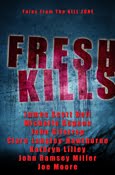
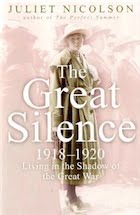 nd accounts from people across the social spectrum. The result is incredibly moving (I went through a whole box of tissues), especially when she deals with the decision to introduce a two minute silence to remember the dead (a hush literally fell across England as the 11th hour struck on the 11th day of the 11th month in 1919) and the return of the unknown soldier, who represented all the husbands, fathers, and sons who never made it home.
nd accounts from people across the social spectrum. The result is incredibly moving (I went through a whole box of tissues), especially when she deals with the decision to introduce a two minute silence to remember the dead (a hush literally fell across England as the 11th hour struck on the 11th day of the 11th month in 1919) and the return of the unknown soldier, who represented all the husbands, fathers, and sons who never made it home. 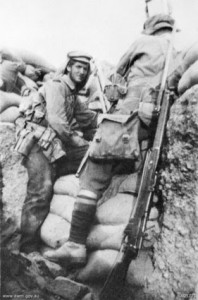 onal identity and altered the way Australians perceived the British Empire forever. When war was declared in 1914 thousands of Australians rushed to enlist – it was considered every Australian’s duty to defend ‘King and Country’. The horrific debacle at Gallipoli and the slaughter of Australians on the Western Front, however, changed all that. The statistics are staggering: From a population of fewer than five million, almost 417,000 Australian men enlisted, and of those over 60,000 were killed and 156,000 wounded, gassed, or taken prisoner. At the end of the war memorials were erected in nearly every town across Australia – you can still see them today – and it is clear from the names of the young men listed that no community or social strata were spared.
onal identity and altered the way Australians perceived the British Empire forever. When war was declared in 1914 thousands of Australians rushed to enlist – it was considered every Australian’s duty to defend ‘King and Country’. The horrific debacle at Gallipoli and the slaughter of Australians on the Western Front, however, changed all that. The statistics are staggering: From a population of fewer than five million, almost 417,000 Australian men enlisted, and of those over 60,000 were killed and 156,000 wounded, gassed, or taken prisoner. At the end of the war memorials were erected in nearly every town across Australia – you can still see them today – and it is clear from the names of the young men listed that no community or social strata were spared. 
